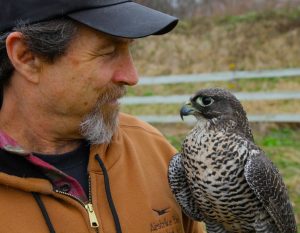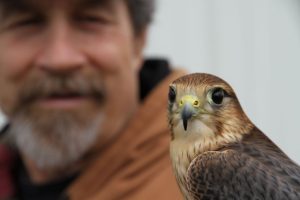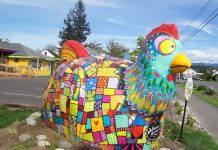I have a few blueberry bushes in my backyard. And I would love to eat the berries from them. I could make a pie … or sprinkle them on my kids’ cereal. Every year, however, I am somehow too slow on the uptake. One day I notice the berries turning slightly blue and the next time I think to check the fruit is all but decimated. I have fierce competition in the birds that swoop from above and consume them before I can pick enough for even a modest cobbler.

Living out in the country as I do, I often drive past fields of blueberries and raspberries that stretch for hundreds of acres. Sometimes the endless rows are covered in a vast stretch of netting to protect the fruit from hungry birds. Sometimes, though, they are not. So, I wonder, if I am disheartened when my would-be harvest of a few quarts of berries disappears, how does a farmer fend off giant flocks of starving starlings?
For many berry operations, nets are an expensive option. And while there are a host of other ways to mitigate problem birds, many are temporary fixes and unsuccessful in the long term. It turns out, the most effective way to get rid of birds is with birds. Or, more precisely, the ancient art of falconry.
A falconer is a person who trains birds of prey to hunt game, a practice that is a complex undertaking, requiring years of apprenticeship under strict federal regulations. For most, falconry is a sport or hobby like other forms of hunting. But falconry also works extremely well to deter a flock of common starlings from a crop of berries since these non-native, invasive birds are innately terrified by the raptors.

During harvest time a berry producer will contract with a bird abatement company and for a week leading up to and the duration of the harvest. At this time a master falconer will fly birds seven days a week, from sunup to sundown. This constant presence of a natural predator ensures that the problem birds stay away from the harvest, leaving the berries for us human consumers. These master falconers are more than hired hands, however. They are raptor enthusiasts, advocates and committed conservationists.
One such champion is Brad Felger, master falconer and founder of Airstrike Bird Abatement, Inc. Brad has been practicing falconry since 1970 when he was 11 years old. He is a licensed bird of prey breeder and the president of the Washington Falconers Association. I went out to visit him at his rural, riverside home, which doubles as a bird sanctuary. His comfort in the world of raptors was immediately obvious in his calm expression and relaxed gait as we walked the grounds, peeking in and out of buildings and bird habitats, meeting and greeting his winged companions.
This is not just work. This is not just a hobby. It seems to have grown from within him, so natural is he with a raptor on his arm. As he lifted up Hoko, a 3/4 gyrfalcon, 1/4 fijian peregrine, their faces close to touching, I asked him why he became a falconer. What influenced him at such a young age? His answer was an incomplete, and perfectly honest, “I don’t know,” reinforcing my hunch that he was born with this love of powerful avians.

Brad was a farrier in Paso Robles, CA in the early 1990s over a period of time when cowboys were being replaced with vintners, horses with grapes. The green pastures over which he commonly flew his birds became expanses of grapevines. As his falcons and hawks flew nearly 1,000 feet in the air and dove down to claim their prey, entire flocks of problematic starlings would immediately dart away from the grapes. Vineyard owners took notice. Brad took meetings. And a company was born.
Brad slowly transitioned out of horseshoeing and into full-time falconry. As his business expanded beyond vineyards, he found himself frequenting the Pacific Northwest. He fell in love with the area and its people, settling here permanently five years ago to run his bird abatement business from Washington state.
Airstrike remains a fast-growing company, with clients from not only the wine and berry industries, but also dairy farms, oil refineries, landfills, box stores and anyone else who may have a problem with roosting birds of any kind. Clients are attracted to the sustainable, non-lethal aspects of falconry and, of course, to the results. As long as a fierce falcon is flying overhead, your harvest is safe from above.










































